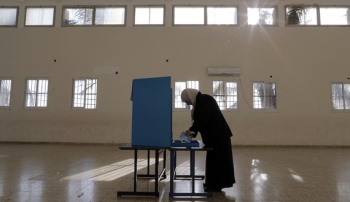As of midnight on Tuesday, nearly 1,000 candidates had registered with the Interior Ministry to run in the upcoming and long-delayed parliamentary elections scheduled for May 6.
The estimated 1,000 candidates represent the highest in the history of Lebanon’s parliamentary elections, and provides the cash-strapped state treasury an unexpected windfall of USD$5.28 million from fees levied for candidacy registration.
The Prime Minister Saad Hariri said he is hopeful that the elections will bring real change to the country because the results are impossible to predict under the new vote law. “I have great hope for the country. It is true that political differences will remain … but these elections, God willing, will open a new horizon,” Hariri said at the Grand Serail Monday night, according to a statement. Hariri expressed his hopes for the future under the new electoral law.
“For the first time in the history of Lebanon, we agree on a [vote] law that is not in the interest of any political party,” Hariri said. “There are those who are arrogant and claim that they can control all the votes and results [in the elections]. I assure you that this law is not easy for anyone to control it.”
Among the near-one-thousand candidates are 108 females versus the 12 female candidates registered in the last parliamentary elections in 2009, said Faten Younis, Head of Political and Refugee Affairs at the Interior Ministry. Elections promise to be hotly contested between rival political factions, with independents and civil society groups jostling to gain seats in the 128-member legislature.
Although rival political parties are still exploring possible alliances in elections that will be conducted under a new proportional vote system for the first time, Hariri confirmed after a meeting with MP Walid Jumblatt Monday night that the longstanding coalition between the Future Movement and Progressive Socialist Party in all districts would continue. He also said that electoral coalitions with the Free Patriotic Movement and the Lebanese Forces were still being examined.
Hariri’s coalition government, which took office in 2016, agreed on the new election law in June 2017, but setting the date was held up while officials debated technical details and registered Lebanese citizens abroad.
His pro-Western, Saudi-backed political alliance has unraveled. For the past year he has led a power-sharing government which includes the heavily armed, Iran-backed Shi’ite movement Hezbollah, despised by his Saudi allies. In 2017, he sparked a political crisis by announcing his resignation while in Riyadh and denouncing Hezbollah and Iran. He stayed abroad for two weeks before returning, and finally withdrew his resignation.
Lebanon is a country caught in a confrontation between Saudi Arabia and Iran. Hariri said that new vote law would allow “new faces” to enter Parliament. The new law is expected to give independent and civil society candidates a fighting chance and blow holes into electoral alliances that formerly dominated entire districts.
The Future Movement’s parliamentary bloc highlighted the importance of holding the elections on time, stressing “…the importance of heavy and effective participation in the elections so as to enhance the democratic life in Lebanon and asserts the presence, role and significance of the parliamentary Future bloc and the Future Movement in Lebanon’s political life,” said a statement issued after the bloc’s weekly meeting chaired by former premier Fouad Siniora.
Watch this space.

